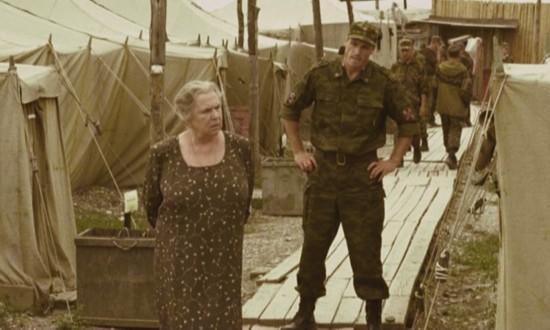

Reviews of Recent Independent, Foreign, & Documentary Films in Theaters and DVD/Home Video
Written & Directed by Alexander Sokurov Produced & Music by Andrei Sigle Director of Photography, Alexander Burov Edited by Sergei Ivanov Released by Cinema Guild Language: Russan with English subtitles Russia. 92 min. Not Rated With Galina Vishnevskaya, Vasily Shevtsov & Raisa Gichaeva
Is gruesome realism the only way to communicate the horror of war? And what happens when an
antiwar film eschews all literal images of destruction? When the director is renowned Russian cinematic poet Alexander Sokurov, the result is more
powerful than a visually exploitative bloodbath. In Alexandra, Sokurov affectively meditates on war without ever showing it, by gleaning its
reflection in the people it touches.
Though never expressly declared, Alexandra is presumably about Russia’s involvement in Chechnya – an on again off again war over the province’s
independence. But the conflict provides more of a setting than a plot, which, for Sokurov, hardly even exists (take his
Russian Ark, composed of one long, uninterrupted time-traveling shot through Russian history).
The premise: an elderly babushka visits her 27-year-old grandson, an army captain,
stationed somewhere on the Chechen border. Alexandra (opera star Galina Vishnevskaya) enters the surreal, dusty landscape of his military outpost,
clumsily, almost hesitantly. She sighs heavily as dirty young boys sporting Kalashnikov assault rifles help her on and off trains and lead her around
their desolate barracks.
While violence rages on the periphery of the film, Alexandra’s world barely extends beyond the outpost. Except for a few brief moments of joy upon
seeing her grandson, she shuffles through this world in a weary malaise – it isn’t just her aching legs or her loneliness after her husband’s recent
death. It’s the fatigue of pessimism about Russia and war, as only a witness to World War II could experience. When her grandson takes the elderly
woman on
a tour of the facilities and shows off his weapons as if he were showing her a report card, Alexandra touches everything with curiosity, resignation, and,
perhaps, a feeling of déjà vu. She remembers Russia’s difficult past and foresees a sadly similar future – silently commenting on the
futility of war with a deeply felt performance.
The few overt indications of the director’s pacifist agenda occur when Alexandra briefly crosses into Chechen territory. When a local boy asks her
for his people’s freedom, as if this iconically harsh and maternal woman were Mother Russia herself, we’re reminded that Sokurov’s almost mythical
project is rooted in real and contemporary events. Otherwise, the film retains an eternal and mythical ambience, with a moral for any conflict at
any time.
Yana Litovsky
|